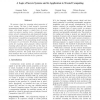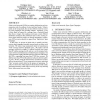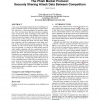111 search results - page 14 / 23 » Characterization of Secure Multiparty Computation Without Br... |
98
Voted
CRYPTO
2000
Springer
15 years 5 months ago
2000
Springer
Abstract. Non-committing encryption enables the construction of multiparty computation protocols secure against an adaptive adversary in the computational setting where private cha...
94
Voted
KDD
2004
ACM
16 years 1 months ago
2004
ACM
Secure multiparty computation allows parties to jointly compute a function of their private inputs without revealing anything but the output. Theoretical results [2] provide a gen...
116
Voted
SP
2009
IEEE
15 years 7 months ago
2009
IEEE
We present a logic for reasoning about properties of secure systems. The logic is built around a concurrent programming language with constructs for modeling machines with shared ...
118
Voted
CCS
2010
ACM
15 years 27 days ago
2010
ACM
Online social networks (OSNs) are popular collaboration and communication tools for millions of users and their friends. Unfortunately, in the wrong hands, they are also effective...
100
click to vote
FC
2010
Springer
15 years 4 months ago
2010
Springer
A key way in which banks mitigate the effects of phishing is to remove fraudulent websites or suspend abusive domain names. This ‘take-down’ is often subcontracted to special...



